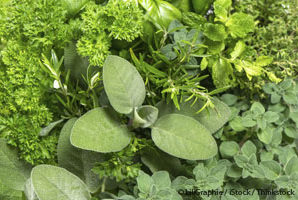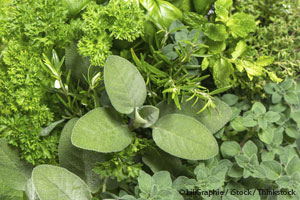Ultimate Guide to Herbal Oils
More Information
Herbs not only add taste and texture to food, but are also abundant sources of antioxidants, vitamins, minerals, and unique medicinal properties. Certain herbs and spices can even help you maintain a healthy body weight, as they promote weight loss.
“Herbs” and “spices” are often used interchangeably, however there are differences between them. Herbs are obtained from the leaves of herbaceous or non-woody plants, and are used in larger amounts that spices. Spices, on the other hand, are obtained from roots, flowers, fruits, seeds, or bark, and are usually used in smaller amounts than herbs because of their higher potency and stronger flavor.
Herbs come in various forms, including dried leaves and teas. But this site focuses on herbal oils, which you can make at home or purchase at health food stores. These oils have their own set of uses and benefits, from food preparation to skin therapy and other practical uses.
Herbal oils can be taken or used in different ways, such as for cooking and topical application.
They can also be essential or infused. Essential oils require a large quantity of plant material and need to be diluted before use because they are concentrated. Infused oils, on the other hand, use only a small amount of plant material and are used full-strength. Essential oils can be used in different ways, including aromatherapy, skin massage, adding them to bathwater, using them in a compress, or burning them in a diffuser.
In general, using fresh herbs is preferred to getting processed varieties. Just as using too much of any food or health product can carry health risks, herbal oils should be used moderately, and are NOT a substitute for a nutritious, balanced diet. Pregnant women especially need to consult their physician before consuming or using these oils.
Dr. Mercola’s Herbal Oil List is a directory that provides you the A-Zs of herbal oils, and their time-tested health and healing properties. Learn the safe, effective ways of using them – in your cooking, as aromatherapy stress relief after a long day at work, and even for natural disinfection and household care.
Canola Oil
- Tea Tree Oil
- Olive Oil
- Peppermint Oil
- Oregano Oil
- Lavender Oil
- Eucalyptus Oil
- Arnica Oil
- Bergamot Oil
- Calendula Oil
- Citronella Oil
- Corn Oil
- Cottonseed Oil
- Frankincense Oil
- Geranium Oil
- Lemongrass Oil
- Myrrh Oil
- Patchouli Oil
- Rosemary Oil
- Sea Buckthorn Oil
- Soy Bean Oil
- Thyme Oil
- Wintergreen Oil
- Grapefruit Oil
- Pine Oil
- Sandalwood Oil
- Carrot Seed Oil
- Ginger Oil
- Vetiver Oil
- Sage Oil
- Cypress Oil
- Neroli Oil
- Lime Oil
- Nutmeg Oil
- Peanut Oil
- Rosewood Oil
- Spearmint Oil
- Vanilla Oil
- Cinnamon Leaf Oil
- Comfrey Oil
- Parsley Oil
- Anise Oil
- Bay Oil
- Clary Sage Oil
- Clove Bud Oil
- Hyssop Oil
- Lemon Eucalyptus Oil
About Dr. Mercola:
Dr. Joseph Mercola is an osteopathic physician who first opened his practice outside Chicago, Illinois, in 1986, and has treated over 20,000 patients. In 1997, he established Mercola.com, now the #1 Natural Health site, where he continues to provide useful health and medical resources.
Dr. Mercola has authored three New York Times Bestsellers, Effortless Healing, The Great Bird Flu Hoax and the No-Grain Diet. He has also been featured in numerous publications and TV programs, like TIME magazine, LA Times, CNN, ABC News, Fox News, and the Dr. Oz Show.
Source:: Mercola Health Articles




 Body Charge Nutrition is a premium nutritional supplement provider based in Western Canada offering only products and information that are of the highest quality and integrity. Through knowledge and personal experience, it is our goal to assist you with taking control of your health.
Body Charge Nutrition is a premium nutritional supplement provider based in Western Canada offering only products and information that are of the highest quality and integrity. Through knowledge and personal experience, it is our goal to assist you with taking control of your health.